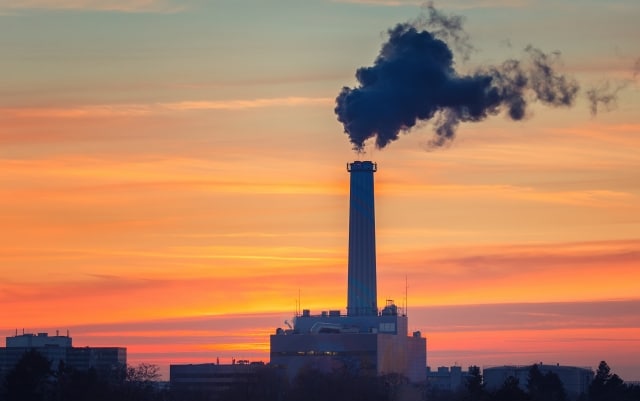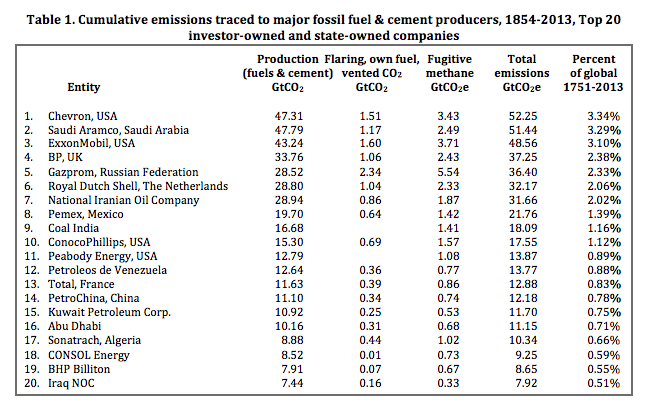If the governments of the world get serious about tackling climate change and adopt aggressive limits on global warming emissions, many fossil fuel companies’ could see their assets become stranded, forcing them to fundamentally change their business models or go out of business altogether.
But there’s another reason why those companies are so desperate to forestall any and all attempts to rein in climate emissions by holding polluters accountable: fossil fuels companies themselves are responsible for a massive amount of the greenhouse gases cooking our climate.
The Climate Accountability Institute has updated its Carbon Majors Project in time for the climate talks in Lima, Peru, “detailing the direct and product-related emissions traced to the major industrial carbon producers in the oil, natural gas, coal, and cement industries” through 2013. CAI has found that the carbon-based fossil fuels and cement produced by just 90 entities were responsible for 65% of the 1,443 billion metric tonnes of CO2 emitted between 1751, the dawn of the industrial era, and 2013.
Some 50 investor-owned companies are among the 90 entities on the Carbon Majors list, and they are collectively responsible for nearly 22% of all global warming emissions up to 2013, while the 36 state-owned companies on the list are responsible for another 20%.
Chevron tops the list of cumulative emissions traced to fossil fuel- and cement-producing companies—one company responsible for 3.34% of all greenhouse gases that have been dumped into our planet’s atmosphere. Exxon isn’t far behind, coming in at third with 3.10%.
Here are the top 20 climate changing companies on Earth:
Click chart to view larger size.
Government-run industries are responsible for more than 23% of historical emissions, according to CAI.
But it’s the investor-owned, for-profit entities that deserve the real scrutiny right now, because they are the ones waging an all-out campaign to block any and all attempts by the governments of the world from taking meaningful action on climate change.
In the past few days alone, a variety of news reports have come out showing just how brazen the attempts by fossil fuels companies to evade responsibility for their polluting ways really are.
For instance, the New York Times reports that energy companies are buying off the top law enforcement officials in several U.S. states in order to wage a battle against President Obama’s climate initiatives: “Attorneys general in at least a dozen states are working with energy companies and other corporate interests, which in turn are providing them with record amounts of money for their political campaigns, including at least $16 million this year,” the paper writes, adding, “They share a common philosophy about the reach of the federal government, but the companies also have billions of dollars at stake.”
One egregious example cited in the NYT article is of Oklahoma’s Republican AG, Scott Pruitt, who sent a letter to the U.S. Environmental Protection Agency accusing the agency of “grossly overestimating” the air pollution caused by drilling for natural gas in his state were “grossly” overestimated. The letter was written by the chief lobbyist for Devon Energy. Pruitt had changed just 37 of the 1,016 words in the letter before sending it to the EPA on his own state government letterhead.
Meanwhile, the Washington Post reports that “Oil, gas and coal interests that spent millions to help elect Republicans this year are moving to take advantage of expanded GOP power in Washington and state capitals to thwart Obama administration environmental rules.”
Industry lobbyists, officials from companies like Koch Industries and Peabody Energy, and legislators came together recently at a summit hosted by conservative bill mill ALEC, according to the WaPo, to hash out several pieces of model legislation “to be introduced across the country next year, designed to give states more power to block or delay new Obama administration environmental standards, including new limits on power-plant emissions.”
The WaPo article also says that a key component of the industry’s strategy is “an effort to apply pressure on Washington from state capitals, where the GOP has gained substantial ground,” which of course we’ve already seen in action thanks to the NYT article.
More than regulations that bring down emissions levels from power plants or require natural gas companies stop polluting our air, what fossil fuel companies fear most is something known as the “polluter pays” principle, which Naomi Klein recently wrote about in The Guardian:
When Valerie Rockefeller Wayne explained her decision to divest [her family foundation’s holdings from fossil fuels], she said that it was precisely because her family’s wealth was made through oil that they were “under greater moral obligation” to use that wealth to stop climate change.
That, in a nutshell, is the rationale behind polluter pays. It holds that when commercial activity creates hefty public health and environmental damage, the polluters must shoulder a significant share of the costs of repair.
Given the magnitude of their responsibility for cumulative climate changing emissions, it’s unlikely Chevron or Exxon could ever be made to pay up entirely. But it would seem they and other fossil fuels companies aren’t willing to take that chance.
Image Credit: S.Borisov / Shutterstock.com
Subscribe to our newsletter
Stay up to date with DeSmog news and alerts








